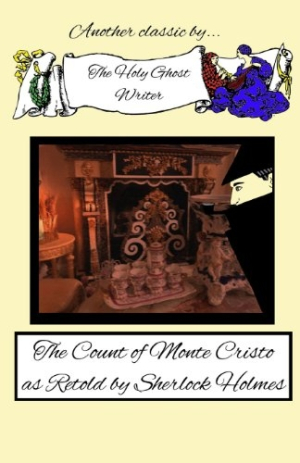The Count of Monte Cristo as Retold by Sherlock Holmes
Literary worlds collide in this amusing retelling of a classic tale.
This anonymously penned tome retells Alexandre Dumas’s classic in the assumed voice of Sir Arthur Conan Doyle’s most-celebrated character. Billed as the first in a trilogy intended to send Edmond Dantes on grand new adventures, this preliminary offering manages to distill both Dumas’s infamous tale of intrigue and betrayal and Sherlock Holmes’s unique voice, though without quite preserving the charm which made both famous.
The storytelling vehicle is a curious one, and often the text seems burdened by the affectation. Readers may find themselves wondering why Holmes is telling Dantes’s story at all; this will put them in good company with the secondary major character, the always-captive Watson. Both audiences are told Holmes is revealing a deeper layer of the mystery, though the assurance that much was lacking in the original isn’t well imparted.
As he sits in Holmes’s study for days on end, Watson is subjected to the tale of Dantes’s imprisonment and quest for revenge. Dumas’s breathless grandiloquence is substituted with succinct, if clunky, prose in this version. “Be patient, dear Doctor. It won’t be long now, but let’s continue the story,” Holmes implores Watson when the doctor wants to break for lunch; unceremoniously, the author reveals that Holmes “then continues the story.”
Its progressions are familiar: Dantes is framed, relegated to a political prison, meets an old man who educates and refines him, and is bequeathed with a map to a fortune on the day he escapes. As in the original, his heart is set on revenge.
Beyond the diluted language, transitions prove a major difference: gone is the suspenseful pace, replaced by Holmes and Watson luxuriating at home and appreciating, aloud, their victuals. These exchanges are sometimes amusing, and the descriptions of food provide the book with its most unique moments. Still, the intrigue is diminished by their retirees’ pace. And, as these interruptions are infrequent, it would be easy for the reader to forget which narrator is operating. Dantes’s simplified tale comprises the bulk of the project; Holmes’s intrusions come to seem, if sometimes endearing, also superfluous.
Reducing Dantes’s story to plot points, little differs between the original and this retelling, beyond the input of the peripheral characters. The prose may be more accessible, but this makes it simultaneously less engaging, and there may be cause to reach for the original instead. “Are you surprised?” asks Holmes at one point; “Not in the least,” replies Watson. The same could be said of the retold story which they share. This book is a conceptually intriguing project, delivered with sincerity, but it never quite manages to live up to its daring attributes.
Reviewed by
Michelle Anne Schingler
Disclosure: This article is not an endorsement, but a review. The publisher of this book provided free copies of the book and paid a small fee to have their book reviewed by a professional reviewer. Foreword Reviews and Clarion Reviews make no guarantee that the publisher will receive a positive review. Foreword Magazine, Inc. is disclosing this in accordance with the Federal Trade Commission’s 16 CFR, Part 255.

